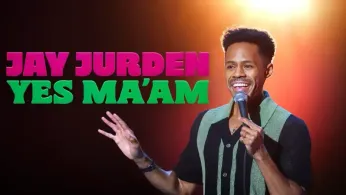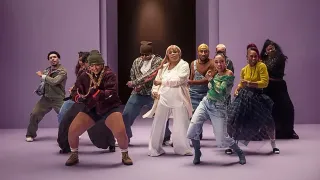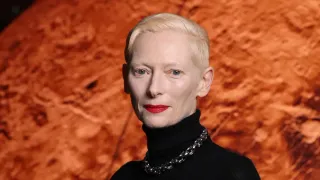
3 hours ago
Jay Jurden's "Yes Ma'am" Is the Queer Comedy Special We've Been Waiting For
READ TIME: 6 MIN.
There's something sacred about a first comedy special. It's the moment when a comedian gets to tell the world, "This is who I am, and here's what I've got to say." For Jay Jurden, that moment arrived in November with the premiere of "Yes Ma'am" on Hulu, and it's a debut that feels like both a culmination and a beginning.
Jurden, a queer Black comedian from Mississippi, has spent years building a reputation as one of the most vital voices in stand-up comedy today. His journey to this Hulu special wasn't a straight shot—it was methodical, intentional, and deeply rooted in the work. The special, filmed in New Orleans, represents material that Jurden has been workshopping since 2021, refined through countless weekends on the road where he treats every performance like he's taping a special.
What makes "Yes Ma'am" particularly significant is that it arrives at a moment when queer comedy—especially comedy by queer people of color—is finally getting the platform and resources it deserves. Jurden's special is a direct challenge to the notion that queer stories are niche; his material proves that authenticity, specificity, and stellar writing transcend any demographic boundary.
One of the most delicate tasks facing any comedian preparing their debut special is curation. Which jokes make the cut? Which ones feel essential to who you are as a performer, and which ones might be better saved for the next chapter?
Jurden had already navigated this process once before. In 2020, he released his debut comedy album, "Jay Jurden Y'all," which taught him valuable lessons about selecting material that would define his public persona. But a comedy special—especially one arriving on a major streaming platform—carries different weight. It's the version of you that will live forever on the internet, the one that people will reference and quote and share with friends.
"When I was thinking about the jokes I wanted to do, on your debut album you want to do the hit singles," Jurden explained in an interview with Out "So there were jokes I knew I had to do. "
Those "hit singles" include material Jurden has performed on "The Tonight Show Starring Jimmy Fallon"—which he's appeared on four times. But here's where things get interesting: for network television, comedians have to sanitize their work. They have to follow standards and practices. They have to make their jokes palatable for primetime audiences who might be watching with their families. On Hulu, Jurden got to unleash the uncensored versions of those jokes, the dirty, unfiltered takes that represent his actual voice.
This is no small thing. For queer comedians, especially those who center sexuality and queer specificity in their work, the ability to be explicit—to talk about sex, desire, and queer life without euphemism—is liberating. It's the difference between performing and confessing.
Perhaps the most touching element of "Yes Ma'am" is its title, which carries profound personal significance. During the taping in New Orleans, Jurden's mother was in the audience. And yes, she heard her son perform jokes about sucking dick. She heard him be explicit, vulnerable, and unapologetically queer. And she was there, present, witnessing his moment of arrival.
"So, for those two things to happen for me with this first hour special, I feel very grateful," Jurden said. "And it was a cool 'mama I made it' moment. She was at the taping, people are like, 'do you do these jokes in front of your mom about sucking dick? 'Yeah, I do. She's met my husband."
This detail matters because it speaks to something fundamental about queer joy and family acceptance. Jurden's mother isn't just tolerating his queerness—she's celebrating it. She's showing up to watch him perform his most authentic self. In a cultural moment when queer people, particularly Black queer people, are facing unprecedented legislative attacks and cultural backlash, the image of a mother witnessing her queer son's triumph is quietly revolutionary.
The title "Yes Ma'am" carries multiple meanings. It's a Southern phrase, rooted in Jurden's Mississippi upbringing. It's an affirmation. It's a declaration of presence and visibility. And it's a nod to his mother's role in his story.
The partnership between Jurden and Hulu didn't happen overnight. According to Jurden, conversations with the streaming platform began roughly three years ago, when Hulu representatives attended one of his early hour-long sets in Los Angeles. They saw something in his work—a combination of technical skill, cultural specificity, and emotional depth—that made them want to invest in his comedy.
"They came to one of the early hours I did in Los Angeles and really liked my stuff, and they got kind of deeper into comedy, and they had the Hularious series that came out starting last year and kind of folded over into this year, "Jurden explained.
This trajectory reflects a broader shift in how streaming platforms are approaching comedy. For years, the major comedy specials were dominated by a particular demographic—straight white men, primarily. But in recent years, platforms like Hulu, Netflix, and HBO Max have begun actively seeking out diverse voices, including queer comedians and comedians of color. "Yes Ma'am" is part of this evolution, though it's important to note that Jurden's success isn't just a result of platform benevolence. It's the result of years of work, of honing his craft, of building an audience that believes in his vision.
What's particularly striking about Jurden's approach to his special is his explicit intention: he wants Black people and queer people to come to his show and feel represented. But he's not willing to sacrifice comedy for the sake of representation. In fact, he sees those two things as inseparable.
"I want to make sure I'm doing comedy so that Black people and queer people can come to my show and not only feel represented, but be happy… And, most importantly, laugh," Jurden said.
This is a crucial distinction. Representation without quality is just tokenism. But Jurden holds himself to a rigorous standard, shaped by comedians like Luenell—a performer known for her explicit, fearless comedy. "I'm also a snob, so I hold myself to a very particular standard when it comes to comedy," Jurden acknowledged.
The special's significance extends beyond Jurden himself. In a landscape where queer comedy is still fighting for visibility and resources, "Yes Ma'am" represents a validation of queer voices. It says that our stories matter, that our perspectives are worth platforming, that our humor—rooted in lived experience and cultural specificity—has value for audiences far beyond our own communities.
When asked what he hopes audiences will experience after watching "Yes Ma'am," Jurden was clear about his intentions: "I want their cheeks to hurt. I want their stomachs hurt. I want people to feel like I just had to work out. I want people to really kind of see that comedy can be extremely funny and extremely well written and well executed."
But there's more to it than just laughter, though laughter itself is revolutionary. Jurden wants people to recognize that comedy can transcend identity categories. "I want people to go, oh, wait a second, I really love this and I might not even be queer, I might not be black, I might not be southern," he explained.
This is the promise of authentic storytelling: when you tell your truth with precision and skill, it becomes everyone's truth. Jurden's experience of navigating the world as a queer Black man from the South isn't just his story—it's a lens through which anyone can examine their own relationship to identity, family, desire, and belonging.
"Yes Ma'am" arrives at a specific cultural moment. Queer people, particularly transgender people and people of color, are facing unprecedented attacks on their rights and dignity. Comedy, in this context, becomes more than entertainment—it becomes resistance. It becomes a way of asserting our right to exist, to take up space, to be heard.
Jurden's special is a declaration that queer voices belong on major platforms, that our stories deserve to be told with nuance and complexity, and that our humor—often born from survival and resilience—has something vital to offer the world. "Yes Ma'am" is Jurden's moment of arrival, but it's also a moment for all of us.






